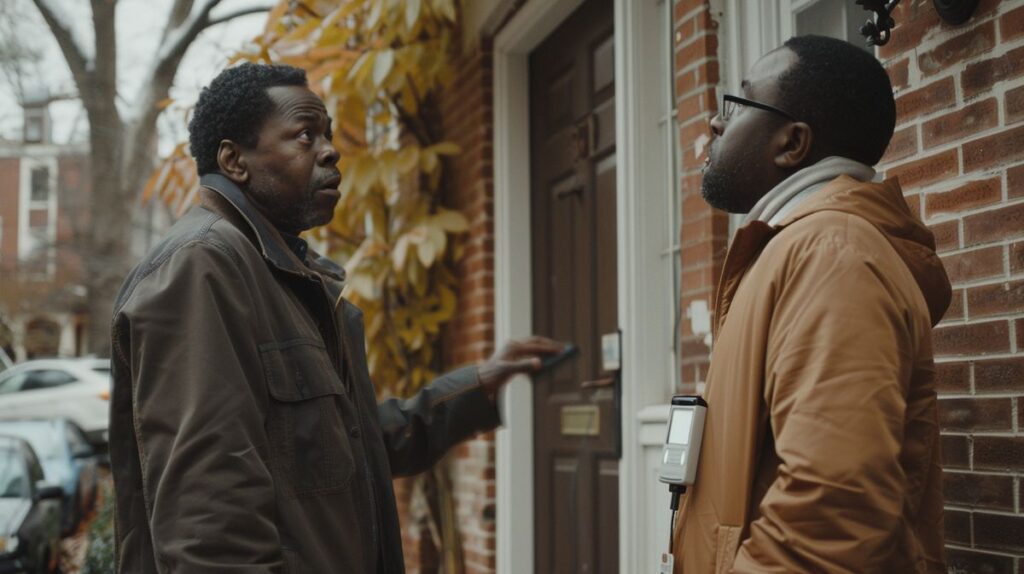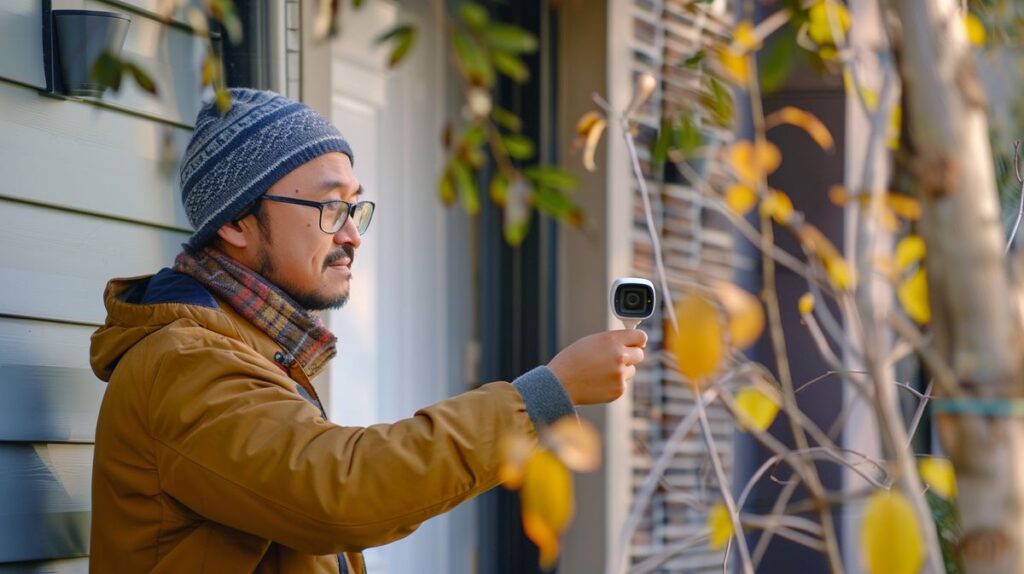Your Guide: Can Tenant Install Security System Without Landlord Permission
“Can a tenant install a security system without the landlord’s permission?” This is a question that’s been circulating within my circle of clients and friends. Though navigating the rental living landscape can sometimes feel like being in a game of chance, when it comes to your safety, it’s not a gamble we want to take.
We’re here to delve into your rights as a tenant, understanding legalities, and finding a way to secure your home that meets all the checkmarks – staying within legal limits and keeping your landlord worry-free.
Let’s take a journey through the maze of rental rules and discover how to maximize your safety while maintaining a harmonious landlord-tenant relationship. Are you ready?
Understanding Tenant’s Rights and Landlord’s Concerns
Why Tenants Want to Install Security Systems
Understanding Tenant’s Rights and Landlord’s Concerns
Both tenants and landlords have specific rights and concerns when it comes to installing security systems. It’s crucial to balance these interests to maintain a safe and harmonious living environment.
Why Tenants Want to Install Security Systems
For many renters, the question isn’t just about safety—it’s about peace of mind. Let’s break it down:
- Personal Safety and Protection: Imagine feeling completely at ease in your living space, knowing it’s monitored and secure. That’s what a security system offers—peace of mind by keeping your home safe from intrusions.
- Reacting to Past Incidents: Once bitten, twice shy. If you’ve faced a break-in before, you know the sense of vulnerability it brings. A robust security system is like a comforting shield, ensuring it doesn’t happen again.
- Family and Property Security: Our loved ones and possessions mean the world to us. Security systems add an extra layer of safety, keeping your family and belongings secure.
Common Concerns of Landlords Regarding Security Installations
Landlords, on the other hand, have their own set of worries. Here’s what often crosses their minds:
- Potential Property Damage: Think about drilling holes or running wires—these installations can lead to property damage, causing repairs that add up quickly.
- Legal and Privacy Issues: In shared spaces, legal and privacy concerns skyrocket. No one wants to risk infringing on others’ privacy, leading to legal entanglements.
- Responsibility and Lease Compliance: Landlords need to ensure the security systems comply with lease terms and don’t infringe on anyone’s rights, maintaining a peaceful living environment for everyone.
Legal Framework and Lease Agreements
Navigating the complexities of installing a security system as a tenant requires understanding the legal landscape and thoroughly reviewing your lease agreement. This ensures you follow all regulations and maintain a good relationship with your landlord.
State-Specific Laws on Security System Installations
- State laws can vary drastically when it comes to tenant permissions for installing security systems.
In this video, learn about the legal considerations surrounding security cameras, including privacy expectations and consent laws, which are vital for tenants thinking about installing security systems without landlord permission.
Some states have strict regulations, while others are more relaxed. - To get precise information, contacting local authorities, such as the District Attorney’s office, is vital. For more insights on tenant rights, you can learn more here. They can provide the exact legal framework and necessary permissions required.
- Alternatively, consulting tenants’ rights organizations or local attorneys specializing in housing laws can also offer invaluable guidance. They can help you understand your legal rights and responsibilities related to security system installations.
What to Look for in Your Lease Agreement
- Before you drill a single hole, grab that lease agreement and scour it for any clauses about property alterations. Look for specifics on mounting security equipment.
- Pay attention to details about the condition in which you need to return the property. Any installed systems might need to be removed, and damages fixed.
- Check if the lease requires you to get written permission or provide advanced notifications for modifications. This could be the make-or-break for your security plans.

Two-Party Consent States and Audio Recording Laws
Understanding audio recording laws is essential, especially if your security system includes this feature. Two-party consent states mandate that all parties involved in an audio recording must give explicit consent. Violating this can have severe consequences.
- In states with two-party consent laws, recording audio without permission from everyone involved is illegal.
In this video, learn about the legalities surrounding the installation of security cameras by tenants, including the importance of checking your lease agreement and communicating with your landlord for permission.
This protects privacy and prevents unauthorized recordings. - Make sure your security system complies with these laws if it has audio recording capabilities. Ignoring this can lead to serious legal issues, like lawsuits and hefty fines.
Indoor vs. Outdoor Security Systems
Understanding the different considerations for indoor and outdoor security systems in rental properties is essential. Each type has its own set of rules, permissions, and potential challenges.
Installing Security Systems Inside the Rental Property
Thinking about setting up a security system indoors? It’s all about juggling the lease agreement and privacy laws. Generally speaking, you can install interior security devices, provided you play by the rules.
- Non-invasive devices are your best bet. WiFi cameras are a great example. They don’t require drilling or permanent changes, and you can remove them easily when you move out. It’s a win-win for security and lease compliance.
- Check that lease. Your lease might have specific clauses about what you can and can’t do. Skim through to avoid any surprises, as some agreements are strict about modifications that might affect your responsibilities or your landlord’s.
Outdoor Security Cameras: Permissions and Potential Issues
When it comes to outdoor security cameras, things get trickier. Here’s what you need to keep in mind:
- Permission is key. Always get the landlord’s consent before setting up outdoor cameras. Common areas are shared, and unapproved installations can stir up disputes or even lead to eviction. The landlord’s input helps ensure you’re not infringing on other tenants’ rights.
- Mind the law. You can’t just record anywhere outside. Public or shared spaces have legal protections, and unauthorized recording can land you in hot water legally—think fines or lawsuits. Make sure you know the restrictions.
- Strategic placement matters. Plan where you’ll put those cameras. Make sure they cover your area without peeking too much into places where others might feel uncomfortable. This careful positioning will help avoid complaints and legal trouble.
Steps to Get Landlord’s Permission
Installing a security system as a tenant can be a delicate matter. Following these well-structured steps can help ensure you get the nod from your landlord.
Making a Written Request
- Communicate security concerns clearly: Picture this: It’s late at night, and those weird noises make you uneasy. Why not clearly outline your security concerns to your landlord? Mention specific incidents or reasons highlighting why a security system is essential. For more context on the importance of security systems, you might be interested in learning about who invented the first home security system. This makes your request resonate more.
- Detail the system and installation process: Ever thought about how specifics make a plan seem foolproof? Outline the brand, model, and features of your chosen security system. Explain the installation process, emphasizing steps that minimize any changes to the property.
Proposing Conditions to Gain Approval
- Use non-invasive equipment: Think of it like applying a removable sticker instead of painting the walls. Opt for security equipment that doesn’t require extensive drilling or modifications. This choice helps maintain the property’s integrity.
- Strategic camera placements: Just as you wouldn’t place a spotlight on your neighbor’s backyard, suggest camera placements that respect privacy. Propose locations ensuring security while not infringing on others’ spaces.
- Share access or promise removal: Want to build trust? Offer to share access to the footage with your landlord or promise to remove everything and restore the property before moving out. This gesture shows you’re responsible.
Documenting Permission for Legal Protection
- Get written agreements: Think of this as keeping a receipt for a major purchase. Ensure any agreement or permission is documented in writing. It’s a formal record that can prevent future disputes.
- Legal safeguard: Written permission isn’t just a formality. It’s your shield if conflicts about unauthorized modifications arise. Having it in black and white protects your rights and promotes a good landlord-tenant relationship.
Alternative Security Measures
Motion Sensors and Security Alarm Systems
Can tenants install security systems without landlord permission? Well, there are certainly some effective and non-invasive options.

- Motion sensors are excellent for tenants seeking quick, non-invasive security solutions. Imagine the peace of mind knowing your home is monitoring itself. They can detect any suspicious movement and notify you immediately, ensuring real-time awareness without the need for extensive installation or modifications.
- Security alarm systems serve as both a physical deterrent and an immediate alert mechanism. These systems can scare off potential intruders and are capable of alerting authorities directly. Think of them as silent guardians, offering a heightened sense of safety.
Smart Locks and Other Tenant-Friendly Options
Security is a top priority for every tenant, but doing so without modifying the property is key. Here are some friendly options:
- Smart locks enhance the security of rental units while being easy to install. They provide advanced features such as remote access and activity tracking without requiring substantial property alteration, making them an ideal choice for tenants. It’s like having a digital key that you can manage from anywhere!
- Wireless security systems are convenient and practical alternatives for renters. These systems, which include cameras and sensors, offer robust security features without the need for permanent installation. Ideal for those who want comprehensive security that doesn’t touch the walls.
Renter’s Insurance as a Security Measure
Ever thought of using insurance as a part of your security measures? It might be a game-changer!
- Renter’s insurance acts as a financial safety net, offering compensation for theft or damage to personal property. It ensures you’re not left bearing the full cost of losses, thereby providing peace of mind.
- Many insurance providers offer reduced premiums for properties equipped with security systems. This not only enhances your personal security but also delivers potential cost savings, encouraging you to invest in additional safety measures.
Managing Denied Permission for Security Systems
Not every landlord is open to tenants installing security systems, which can be frustrating. Let’s explore what to do when you’re in this situation.
Legal Remedies and Tenant Rights
So, what happens if your landlord says no? Well, there are a few paths you can take. You have legal options and tenant rights to consider.
- First off, check your local laws. Tenant rights vary by state, and understanding them can make a big difference. Local tenant advocacy groups are great resources. They can guide you, providing support and potentially even legal advice.
- Research state-specific laws regarding security system installations. These regulations can vary widely, so a deep dive is essential. Reach out to local tenant rights organizations or legal services for insights. This will give you a clearer picture of your options if you face denial.
Considering Moving to a Different Property
Sometimes, sticking to your guns means seeking new pastures. Maybe it’s time to find a new home where security systems are welcomed.
- If security is non-negotiable for you and your landlord won’t budge, consider looking for a rental that explicitly allows security system installations in the lease agreement. This can save you a lot of headaches down the line.
- When browsing for new places, prioritize properties with clear terms on security enhancements. It’s not just about peace of mind. It’s about avoiding future conflicts over unauthorized installations.
Negotiating Other Safety Improvements
If installing a security system isn’t on the table, don’t lose hope. There are other ways to improve safety.
- Suggest other safety measures to your landlord. Enhanced property lighting, neighborhood watch programs, or landlord-managed security can be effective alternatives. These enhancements can significantly boost overall safety.
- Keep communication lines open with your landlord. Propose compromises that benefit both parties. This collaborative approach can lead to effective safety improvements without the need for invasive installations.
Important Considerations for Installation
When thinking about installing a security system in your rental, it’s essential to consider aspects like respecting your neighbors’ privacy, avoiding property damage, and properly removing devices at the end of your tenancy. Let’s break down these key points.
Respecting Privacy and Common Areas
- Respect Boundaries: When installing security cameras, ensure they don’t invade neighbors’ privacy or common areas. Your devices should cover only what’s necessary — your rental unit and private sections.
- Be Discreet: Make sure devices are positioned discreetly, adhering to legal regulations and lease agreements. Avoid pointing cameras at shared spaces or entrances used by other tenants to maintain respect and avoid conflicts. Imagine your neighbors’ discomfort if they feel watched; it’s crucial to balance security and privacy.
Avoiding Property Damage and Unauthorized Alterations
- Non-Invasive Installation: Choose security system components that won’t damage the property. Opt for wireless setups, avoiding drilling holes or extensive wiring. No one wants to create a mess that might result in hefty repair costs or disagreements with the landlord.
-

Legal Implications: Any unauthorized modifications can lead to financial liabilities. Without landlord permission, you might face repair costs or deductions from your security deposit. Remember, restoring the property to its original state is not just courteous; it’s often a requirement.
Properly Removing Security Systems at End of Tenancy
- Complete Removal: When your lease ends, ensure you remove all security equipment, like cameras and sensors. Leave the rental property as you found it. Visualize how the place looked before — that’s your goal.
- Avoid Financial Penalties: Failing to remove equipment and repair minor damages can result in deductions from your deposit. A thorough final inspection is crucial to avoid any unpleasant surprises. For more information on security systems, you may want to check if Blink Cameras are compatible with Ring to ensure comprehensive coverage of your property. Imagine the relief of getting back your full deposit with ease.
Conclusion
Ensuring rental property security often involves balancing tenant rights and landlord concerns. Communication and understanding lease agreements are crucial. Tenants generally want to install security systems to protect their loved ones and belongings, but they must navigate specifics like state laws and lease clauses. For indoor setups, non-invasive technologies like WiFi cameras work best. However, outdoor cameras usually need a landlord’s approval due to shared spaces. For those seeking secure outdoor options, consider using an Anti Theft Ring Doorbell Mount to ensure your device remains safe.
Landlords worry about potential damage, legal issues, and privacy. They need to know that any security system won’t harm the property or violate other tenants’ rights. When seeking permission, tenants should provide detailed requests and suggest conditions that reduce impact. This includes committing to non-invasive equipment and keeping thorough documentation of any agreements.
If installation requests are denied, tenants have other security options such as motion sensors, smart locks, and renter’s insurance. Legal remedies and considering relocation to properties with favorable security policies are practical steps.
Fostering a cooperative relationship with the landlord through open dialogue and documented agreements is key. This ensures both tenant needs and landlord stipulations are addressed, promoting a secure and harmonious living environment.
FAQs on Tenant Security System Installation
When it comes to adding an extra layer of protection to your home, tenants often wonder about their rights and limitations. This section dives into some of the most common concerns and offers practical advice on how to navigate this tricky area.
Can a tenant install a security system without the landlord’s permission?
Generally speaking, landlords prefer to be in the loop, especially when it comes to outdoor security systems that might alter the property’s exterior. However, indoor devices such as WiFi cameras usually get a pass. They don’t cause damage, so many tenants install these without asking—though it’s always a good idea to double-check your lease agreement.
What are some tenant-friendly security system options?
Look for options that don’t require drilling or wiring. For example:
- WiFi Cameras: Easy to set up and move around.
- Motion Sensors: Can usually be placed with adhesive strips.
- Smart Locks: Provide extra security without major changes to the door.
These solutions are hassle-free and less likely to require landlord approval.
What should a tenant do if the landlord denies permission for a security system?
Denial isn’t the end of the road. You’ve got a few options:
- Legal Remedies: Check your local tenant laws, as they may favor your request for added security.
- Suggest Alternatives: Sometimes proposing a less invasive option can sway the landlord.
- Consider Moving: If security is a top priority, finding a landlord who supports these installations might be the ultimate solution.
Why is documenting landlord permission important?
Documenting helps protect your rights:
- Prevents disputes.
- Ensures you won’t face claims for unauthorized changes.
- Keeps your security deposit safe.
Always get written consent to avoid any headaches down the line.
Can installing a security system affect my renter’s insurance?
Absolutely. Many insurance companies offer discounts for homes with security systems. Not only does this provide peace of mind, but it can also save you money. Plus, additional security measures might offer other benefits such as quicker emergency response times and enhanced personal safety.
I’m James Albright, a home security expert with over 15 years of experience, and I’m passionate about helping families protect what matters most. After serving as a police officer, I transitioned to security consulting to share my hands-on knowledge and practical tips. My mission is to make home security simple and reliable by offering clear, no-nonsense advice and easy-to-follow guides. When I’m not reviewing the latest security tech or writing, I’m out in the community leading neighborhood watch programs and, most importantly, keeping my own family safe.





Post Comment